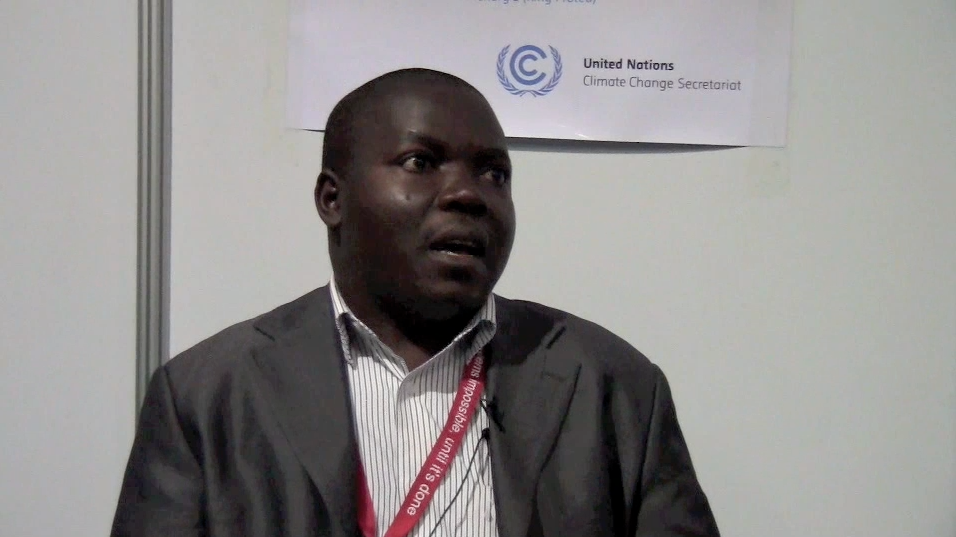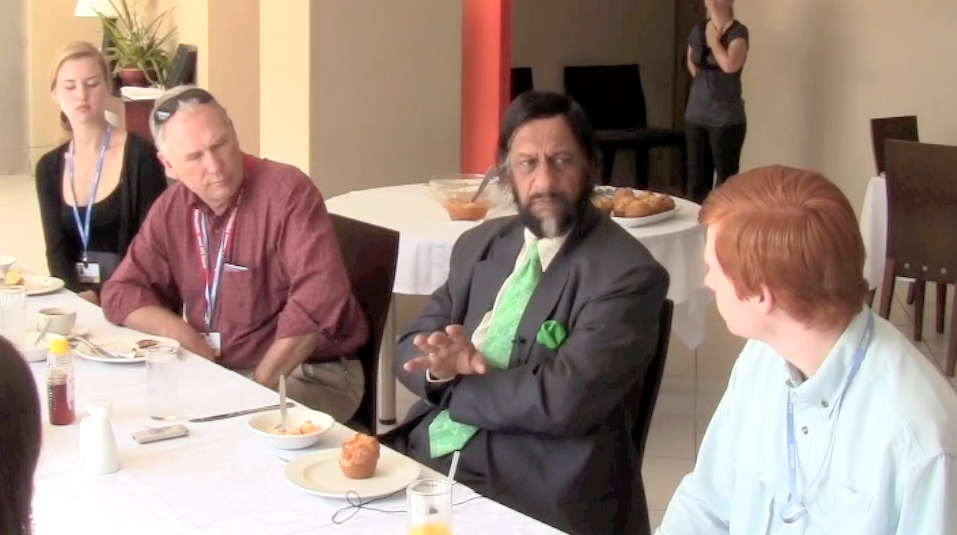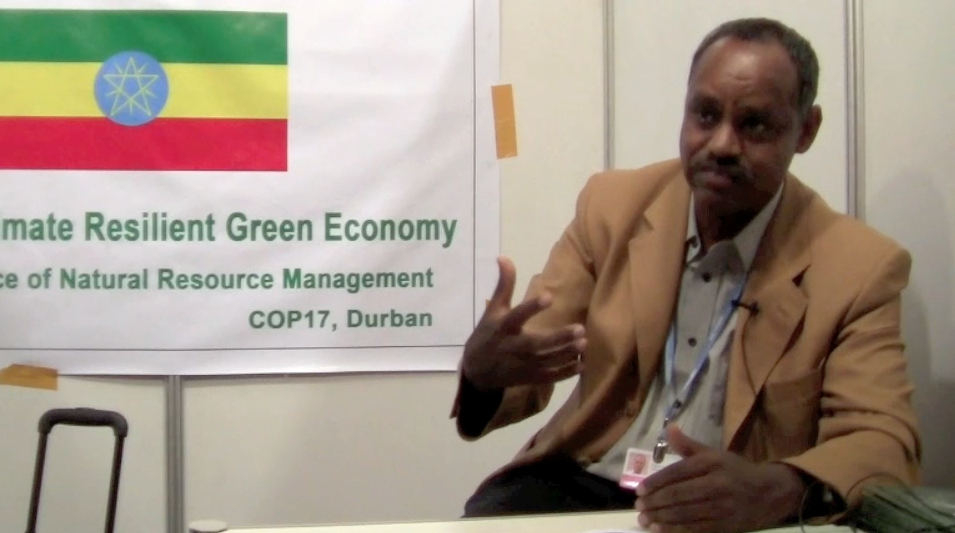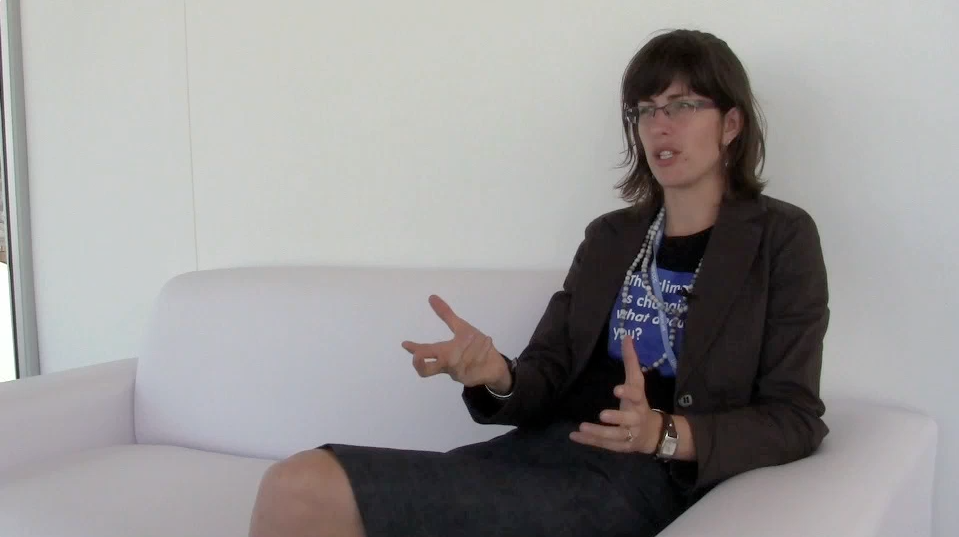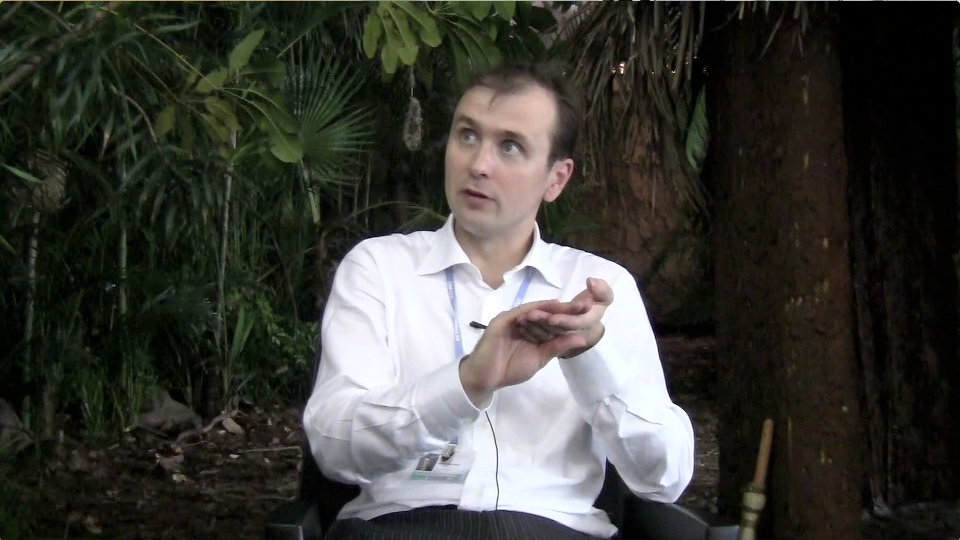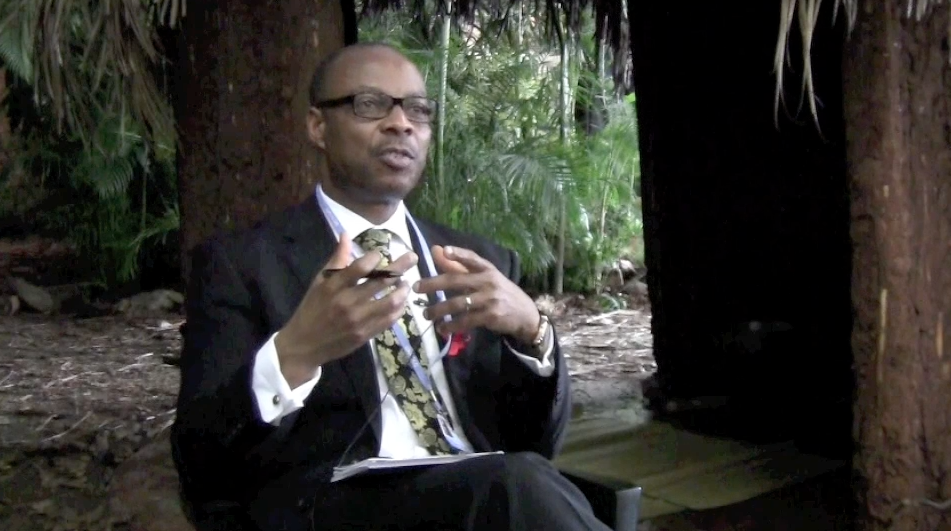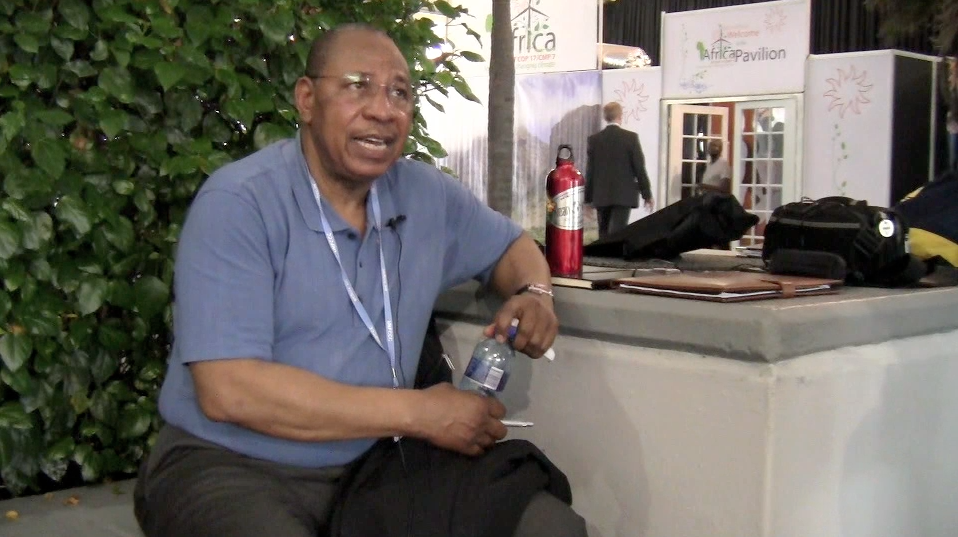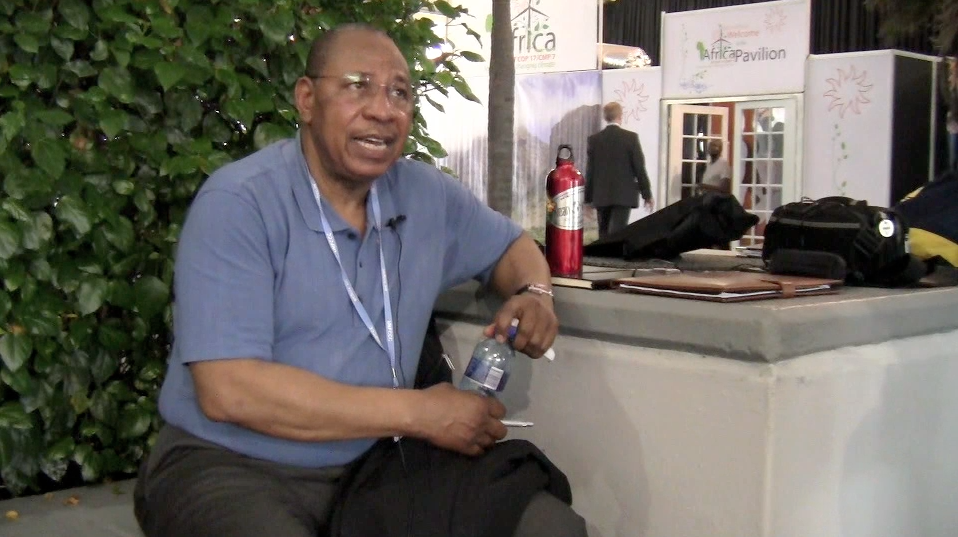Interviewed by Emily Bowie on December 9, 2012, COP 17, Durban, South Africa
Tag: Emily Bowie
Interviewed by Emily Bowie on December 9, 2012, COP 17, Durban, South Africa
Interviewed by Emily Bowie on December 9, 2012, COP 17, Durban, South Africa
Dr. Rajendra K. Pachauri, Chairperson for the Intergovernmental Panel on Climate Change, discusses how his expectations for COP17 in the areas of REDD, funding, and adaptation have not been met. He explains that if they were met it would mean significant progress for climate change, not necessarily major steps, but something to build on. He expresses a fear for the current level of confidence in the system.
Interviewed by the Dickinson Climate Mosaic on December 7, 2011, COP 17, Durban, South Africa
Dr. Rajendra K. Pachauri, Chairperson for the Intergovernmental Panel on Climate Change, discusses how adaptation is going to take a lot of involvement at the local level with state and national involvement to ensure capacity is built. However, mitigation efforts need to take place at a global level because it is a global issue. He also explains how the IPCC increases local capacity of low development regions to collect climate data and understand how climate change will affect them so they can adapt accordingly.
Interviewed by the Dickinson Climate Mosaic on December 7, 2011, COP 17, Durban, South Africa
Dr. Rajendra K. Pachauri, Chairperson for the Intergovernmental Panel on Climate Change, discusses how the process of intense peer review in IPCC report production, while it slows down the process, is extremely necessary in gaining trust from politicians. He voices concern for advocacy for action on the science the IPCC collects. He claims the IPCC does not have the time or resources to advocate for climate action and encourages others to take the sound science they have collected and spread awareness about it.
Interviewed by the Dickinson Climate Mosaic on December 7, 2011, COP 17, Durban, South Africa
Dr. Rajendra K. Pachauri, Chairperson for the Intergovernmental Panel on Climate Change, discusses how both the host country and the secretariat run the COP. He voices concern for the level of ambition at the last few COPs and the perception that little baby steps are great achievements. He fears that the results of these conferences are not enough to warrant the amount of money and resources that go into planning them.
Interviewed by the Dickinson Climate Mosaic on December 7, 2011, COP 17, Durban, South Africa
Dr. Rajendra K. Pachauri, Chairperson for the Intergovernmental Panel on Climate Change, explains the steps he believes need to be taken to breach the gap between climate science and the policy being made. First, the science community needs to communicate more. Second, there are vested interests that need to be addressed. Last, in the context of COP 17, we need to address the fact that science is not playing as big of a role in the conference as it needs to.
Interviewed by the Dickinson Climate Mosaic on December 7, 2011, COP 17, Durban, South Africa
Dr. Rajendra K. Pachauri, Chairperson for the Intergovernmental Panel on Climate Change, discusses the need for urgency in climate change action. The AR4 report declares that in order to stabilize temperature to between 2-2.4 degrees we must peak emissions within four years in the least cost manner. He claims we are losing time because we are losing our least cost options. He is uncertain about solutions to these problems; he voices hesitation about the UNFCCC process as a whole, declares the need for country mobilization, and claims there is a serious lack of leadership and a sense of urgency.
Interviewed by the Dickinson Climate Mosaic on December 7, 2011, COP 17, Durban, South Africa
Dr. Rajendra K. Pachauri, Chairperson for the Intergovernmental Panel on Climate Change, discusses his views of the REDD+ initiative. He claims REDD is important but has a lot of measurement, monitoring and institutional problems.
Interviewed by the Dickinson Climate Mosaic on December 7, 2011, COP 17, Durban, South Africa
Mr. Negash Teklu from Ethiopia, Executive Director of Population, Health, Environment (PHE) Consortium Ethiopia and COP 17 Party Member to Ethiopia, discusses how climate change is affecting the environment in Ethiopia and East Africa in general and how these changes are negatively affecting poverty levels. He also discusses the hope Ethiopia has for the COP and the second period of the Kyoto Protocol.
Interviewed by Emily Bowie on December 6, 2011, COP 17, Durban, South Africa
Mr. Negash Teklu from Ethiopia, Executive Director of Population, Health, Environment (PHE) Consortium Ethiopia and COP 17 Party Member to Ethiopia, discusses the adaptation knowledge that local communities in East Africa possess and the need for governments, civil society and the private sector to engage the local communities and utilize this knowledge for adapting to climate change.
Interviewed by Emily Bowie on December 6, 2011, COP 17, Durban, South Africa
Mr. Negash Teklu from Ethiopia, Executive Director of Population, Health, Environment (PHE) Consortium Ethiopia and COP 17 Party Member to Ethiopia, discusses the activities of PHE-Ethiopia including pilot sites, social research and workshops. He then explains the sources and system of funding for the organization.
Interviewed by Emily Bowie on December 6, 2011, COP 17, Durban, South Africa
Ms. Anna Taylor of the African Center for Cities and the Stockholm Environment Institute discusses how funding for South Africa’s sustainable development needs to come from both internal and external sources. She voices the need to be wary of international money tied to international agendas.
Interviewed by Emily Bowie, Elena Capaldi and Maggie Rees on December 5, 2011, COP 17, Durban, South Africa
Anna Taylor of the African Center for Cities and the Stockholm Environment Institute discusses South Africa’s position as they move forward with sustainable development after COP 17. She notes poverty and economic inequality as the biggest obstacle for South Africa’s development. Coal as the primary source of energy is also a huge issue as the fuel is one of the dirtiest forms of energy and this will need to change as the country develops. Taylor also notes that the country has rapidly transitioned into a democracy and is still working to make that a reality.
Interviewed by Emily Bowie, Elena Capaldi and Maggie Rees on December 5, 2011, COP 17, Durban, South Africa
Ms. Anna Taylor of the African Center for Cities and the Stockholm Environment Institute discusses how the outcomes of the COP will most likely create a downstream effect over development in South Africa that may not be immediately noticeable or easily tracked.
Interviewed by Emily Bowie, Elena Capaldi and Maggie Rees on December 5, 2011, COP 17, Durban, South Africa
Ms. Anna Taylor of the African Center for Cities and the Stockholm Environment Institute discusses her work through both institutions looking at vulnerability and adaptation initiatives. She explains how she is promoting their research, making connections and learning more about climate change. She then explains her hopes for the outcome of the COP and her belief in the need to lead by example. She calls for an end in the negotiations standoff.
Interviewed by Emily Bowie, Elena Capaldi and Maggie Rees on December 5, 2011, COP 17, Durban, South Africa
Dr. Kevin C. Urama, Executive Director of the African Technology Policy Studies Network (ATPS), voices his desire for the government’s of the world to wise up and save the planet. He calls for a legally binding agreement and praises the knowledge sharing occurring at COP 17 between countries. Urama then explains that African adaptation initiatives are coming from multiple actors, the most interesting being rural farmers who are forced to adapt out of necessity. He says funding for these activities comes from multiple relationships – mainly bilateral international and national agencies. He calls for the private sector to invest in adaptation initiatives because governments cannot fund it forever and, he claims, they could make business out of it.
Interviewed by Emily Bowie on December 5, 2011, COP 17, Durban, South Africa
Mr. John Ward, Director of Vivideconomics, discusses the difference between the Adaptation Fund, the Green Climate Fund (GCF) and the Global Environment Facility (GEF), including purposes and sources. He explains the necessity for the GCF separate from the GEF and voices a prediction for the outcome of the conference concerning the GCF.
Interviewed by Emily Bowie on December 1, 2011, COP 17, Durban, South Africa
Mr. John Ward, Director of Vivideconomics, discusses the different sources of funding reserved for adaptation and development initiatives. Development funding is meant to come from the Overseas Development Agency (ODA) while funding for adaptation comes from several sources, some bilateral, some multilateral. He explains the difference between spontaneous and programmed adaptation funding and then explains the “moral” argument around the responsibility of developed countries to pay for adaptation.
Interviewed by Emily Bowie on December 1, 2011, COP 17, Durban, South Africa
Dr. Tony Nyong, Principle Climate Change Expert at the African Development Bank, discusses how local communities have been adapting to climate forever, but that adaptation to anthropogenic climate changes needs to come from a variety of sources. More specifically, he emphasizes that different planning efforts for adaptation are done at different levels and therefore funding has to come from a variety of places including local, national and international sources. He also talks about the role adaptation is playing at COP 17.
Interviewed by Esther Babson, Emily Bowie, Christine Burns, and Maggie Rees on December 1, 2011, COP 17, Durban, South Africa
Dr. Youba Sokona of Ethiopia, the coordinator of the African Climate Policy Centre (ACPC) based in the UN Economic Commission for Africa, discusses the need for a new global paradigm. He also explains the opportunity Africa faces to embark of “jump-start” sustainable development due to the primary stages of development the continent is currently in. He names the four biggest barriers to this solution: political will, institutions, finance and short-term focus. He then provides examples for how each of these barriers can be broken.
Interviewed by Elena Capaldi, Maggie Rees and Emily Bowie on November 30, 2011, COP 17, Durban, South Africa
Dr. Youba Sokona of Ethiopia, the coordinator of the African Climate Policy Centre (ACPC) based in the UN Economic Commission for Africa, discusses how the primary concern of all African countries is development and how through climate research over the past few decades his organization has seen the need for countries to revisit their development objectives. He calls for these countries to follow a different development path.
Interviewed by Elena Capaldi, Maggie Rees and Emily Bowie on November 30, 2011, COP 17, Durban, South Africa
